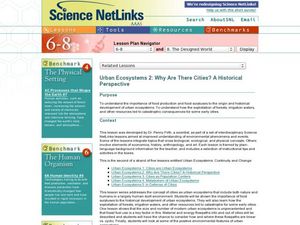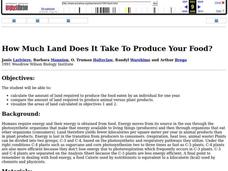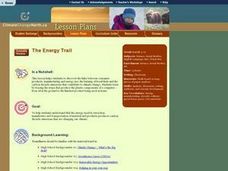Curated OER
Energy Plus!
"Energy Plus!" from Together Counts is three days worth of lessons, discussions, and activities about nutrition. The materials help you teach youngsters about eating healthy and burning calories. Energy in and energy out. Included are...
Curated OER
Construction of Food Chains and Tracing Energy Changes
If you need a few basic activities for teaching food chains to your emerging ecologists, here they are. Three sheets of organism cards are included for learners to cut out and arrange according to trophic relationships. To make the most...
Curated OER
Urban Ecosystems 2: Why are There Cities? A Historical Perspective
Second in a series of five lessons, this lesson encourages preteens to consider cities as urban ecosystems. First, they keep a food diary for a few days. They visit the Natrional Agricultural Statistics Service website for current data...
Curated OER
Urban Ecosystems 2: Why Are There Cities? A Historical Perspective
Students investigate the importance of food surpluses to the historical development of urban ecosystems.
Curated OER
KORN-TV Newsroom
Role-play to learn. Writers pretend to be a team of news writers. They research information about genetically engineered corn and the impact of biotech food products. Then create a video, Powerpoint, or oral presentation to present their...
Baylor College
Energy for Life (Energy from Food)
Energy comes in many forms, but how do living things get the energy they need to survive and thrive? In a simple, controlled experiment with yeast, water, and sugar, groups make observations about how yeast reacts with water alone, then...
Curated OER
Bud the Spud Moves West
As part of a unit on Canadian agriculture, this focuses on how potato farms have increased in the west. Pupils participate in a discussion about the impact of consumer demand on production, and then they read an article about potato...
Baylor College
Your Energy Needs (BMR)
How many Calories one needs on a daily basis is dependent on a number of factors including gender, height, and activity level. In the third of seven lessons about energy and food, young nutritionists calculate the number of Calories...
Curated OER
What is Energy?
Youngsters take a look at the foods they eat, and how they provide energy for them to do things. They look at how body uses the food energy to create movement. Pupils also look at toys/devices in the room that need electrical energy...
Curated OER
Food Preservation: Food Science, Canning, Gardening
Learners consider the procedures and safety issues involved in food preservation. They conduct experiments in canning, freezing and drying. If everyone can preserve food utilizing a variety of methods and science principles, the...
Curated OER
Calculating Your Foodometer
Young scholars explore environmental issues by completing a food production class activity. For this carbon footprint lesson, students discuss the types of foods they eat, where they come from and what types of methods are used to...
Curated OER
Wisconsin Agriculture; Berry Bunch's Cherry Fast Facts
Young scholars explore agriculture by researching Wisconsin's economy. In this cherry industry lesson, students read assigned text about the amount of cherries Wisconsin produces annually and the revenue it brings in to the state. Young...
Teach Engineering
Photosynthesis—Life's Primary Energy Source
Wouldn't it be great if you could produce your own food? Scholars learn about the processes of photosynthesis and cellular respiration in plants. They consider how to use photosynthesis as a model of an efficient system and how to apply...
Curated OER
Food For Energy - Four Food Groups
Students consider how food is converted to energy. In this science lesson plan, students explore the importance of eating properly with a balanced diet as they study 4 food groups.
Baylor College
Energy Sources
Take the concept of burning calories to a more literal level in the second of seven lessons about energy in the realm of food and fitness. Using simple materials, groups will burn breakfast cereal and a pecan to see which one gives off...
Curated OER
How Much Land Does It Take To Produce Your Food?
Students calculate the amount of land required to produce the food eaten by an individual for one year. They compare the amount of land required to produce animal versus plant products. Students visualize the areas of land calculated.
Curated OER
Solar Energy - Dehydration
Sixth graders explore process of drying food using solar energy. They cook and/or dry food such as pumpkins, watermelon, corn, and deer meat, explain how solar energy changes foods, and compare and contrast solar energy with other forms...
Curated OER
Nutrition Labels
Students read and interpret nutrition fact labels ("food labels") from food products, a task that involves the use of various mathematics skills (e.g., number concepts and number sense).
Curated OER
How is Atomic Energy Used Today
Students investigate energy sources by examining photographs. In this atomic energy lesson, students identify and describe various pictures and how atomic energy is used in them. Students create a presentation demonstrating how many...
Curated OER
Energy In Our Lives
First graders investigate the use of energy resources in the community. Using the tools of research and surveys in order to gather information about home and business energy usage they analyze the information in order to come up with...
Curated OER
Nutrition
Fourth graders identify food groups, foods that fit into those groups, and look at the nutritional value of each food group. They also discover how to interpret and understand food labels. The whole class makes some burgers and fries,...
Curated OER
The Energy Trail
Students examine the relationship between the products they use and energy use. Using the internet, they identify the role that manufacturing plays in using energy and the emissions that change the climate. They discover the steps to...
Virginia Department of Education
Photosynthesis and Cellular Respiration
Provide high schoolers with their own indoor gardens! Emerging scientists discuss the process of photosynthesis and germinate seeds before growing plants in multiple lighting conditions. The hands-on application allows pupils to see...
Curated OER
Filling Up-Gasoline
In this fuel sources worksheet, students calculate the E85 alternative fuel costs per gallon compared to the cost of gasoline. Students complete a table to show the comparison prices. They create a triple line graph to show the...

























